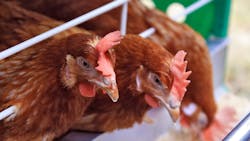USDA inspectors expose dangerous chemical use in poultry plants
The Government Accountability Project (GAP) has issued evidence that it collected from federal poultry inspector whistleblowers regarding the use of chemicals in the U.S. poultry industry and the potential impact this has on human health.
According to the GAP website, two U.S. Department of Agriculture (USDA) inspectors have presented affidavits that reveal their observations of dangerous chemicals being used at various poultry processing facilities. The GAP has made those documents publicly available and said they expose the threat these processing plants pose to consumers' health.
Although the names of the USDA inspectors that produced the affidavits, as well as any other information that could allow their identification, have been removed from the documents, the GAP vouched that they are authentic.
RELATED: Safety key for meat processing plants
Amanda Hitt, GAP food integrity campaign director, said that the organization spent the last two years working on the issue because it had been seriously concerned about the widespread practice of using "questionable chemicals" in poultry production.
The two written statements from USDA inspectors highlighted a number of problems detected in various facilities. For example, they saw an increase in chemical use when facilities dropped so-called "offline processing", in which contaminated birds are removed from the processing line and are treated separately to get rid of fecal matter and other contaminants, and adopted "online processing", in which contaminated birds stay on the main processing line along with the remaining birds and all of them are sprayed with chemicals, such as peracetic acid, against contaminants.
Furthermore, the affidavits reveal that workers in poultry processing plants suffer from continual health problems as a result of being exposed to chemical use for prolonged periods of time. Employees reported sinus infections, asthma, respiratory problems and bronchitis. Despite the fact that both workers and inspectors at poultry processing facilities experience health problems, they are reluctant to raise concerns and to report chemical use because they are afraid they might lose their jobs, the GAP pointed out.
Inspectors claimed that the safety reports they filed were either completely ignored, or led to ineffective measures. One example was the question of poor ventilation that an inspector raised, which was addressed by installing fans that just circulated airborne chemicals, instead of removing them. Another instance mentioned in the affidavits was the fact that heaters and fans that were provided to the processing plants to protect inspectors and employees against extreme temperatures had been removed, causing health problems. One of the inspectors claimed that this was an act of retaliation against them exposing problems at the facilities.
The GAP warned that these problems might become even more serious if the USDA's proposal to reform the national poultry inspection system is approved. Under the proposal the processing lines at facilities will move at a faster rate, potentially increasing the risk of contaminated birds passing undetected. The proposed changes would not only put consumers at risk but would threaten employees as well, Hitt commented.
RELATED: Report calls for quicker response to salmonella outbreaks
With doctors warning of negative health effects from chemicals used in poultry processing, and with inspectors and workers experiencing serious, ongoing health problems, this is just one of the reasons that activists are angry about plans to shift responsibility for inspection from government inspectors to poultry processing companies themselves, the website Treehugger reports.

